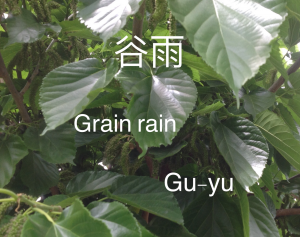
Gu-yu (noun) 谷雨 (Chinese): Grain rain (6th solar terms), literally in Chinese “gu” 谷 = grain, “yu” 雨 = rain.
Example:
In the ancient Chinese calendar also known as the “agriculture calendar”, gu-yu is the 6th term out of 24 solar terms. Gu-yu is also the last term of the spring season. Gu-yu actually is the crop sowing season when there is plenty of rain during the year. Gu-yu begins when the Sun reaches the celestial longitude of 30° and ends when it reaches the longitude of 45°. Gu-yu often refers in particular to the day when the Sun is exactly at the celestial longitude of 30°. In the Gregorian calendar, gu-yu usually begins around April 20 and ends around May 5 of each year. During Gu-yu, the cold weather is basically over, and the temperature rises faster. Precipitation has increased significantly. In ancient China, Gu Yu was divided into three periods: “ In the first-period 萍始生; duckweeds began to grow, and in the second 呜鸠拂其羽; cuckoos began to twitter reminding people to plant, and the last period 戴任降于桑; hoopoes birds were seen on the mulberry tree.” It is said that “Gu-yu Sacrifice Cang-jie (Chinese characters creator)” is a folk tradition that has been circulating for thousands of years since the Han Dynasty. So far, several places in China have retained this custom.
Natural flowers, trees, birds, and animals all live and move according to a certain season. Their activities are closely related to climate change. Each period 候 in a Jie-qi 节气 is associated with a “flower letter breeze” 花信风. During Gu-yu, the first period is associated with Peony 牡丹, the second period with teal flower 荼蘼花, and the third period with neem flowers 栋花. In addition to these three flowers, there are Vernicia flowers 桐花, wheat blossoms 麦花, and willow flower 柳花 that still bloom during Ching-Ming festival.
Since ancient times, Gu-yu has been a solar term for agricultural purposes in the lunar calendar. Gu-yu is still remembered and celebrated as a Chinese traditional festival.

